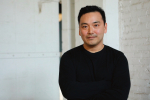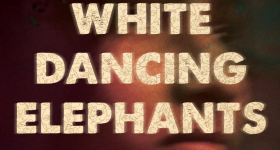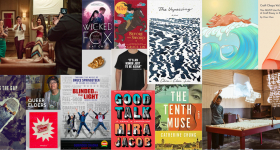Say you are writing a new piece of software.
You should give each version of your software a number to keep track of its progress.
Examples: version 1.5, version 3.11, version 7.24.
Version 1.0 means your software is officially ready to be used in a real-world setting.
Version 2.0 means you made significant updates to version 1.0.
Same for version 3.0, version 4.0, and so on.
If your software is still in development and not yet ready for prime time, you should give it a version number less than one, like version 0.2 or version 0.7.
The absolute first version number for any new piece of software is version 0.1.
There is no such thing as version 0.0.
0.0
Max is 28.
It is some time in the future. Where is he? Probably alone. No friends. No girlfriend. He could still be in Tokyo, among the brutalist canyons of apartment buildings. Office towers crowding into the blue of the early morning haze.
Max must read a lot. What else would there be to do these days?
Say he reloads his vaporizer with a fresh cartridge. Say it looks like a tiny vial of blood. He takes his first hit. On the other side of the planet I step out into the helgic light of late afternoon, wishing I could have one too. But pregnant girls can’t smoke. So I hold two fingers to my lips and inhale an invisible cigarette.
He exhales a billowing wisp taller than himself. It dissipates like a cloud from an Ukiyo-e painting.
Imagine his apartment. Bookcase after bookcase, all the manga and anime he could ever want. No laptops. No devices. A stack of postcards and an inkwell and fountain pen. A small tidy apartment. An ocean of pretty Japanese girls to look at.
Do they remind him of me?
I do not want to think about that.
Maybe he is working on something secret. Or is he simply hiding?
I know all about hiding. I hide in plain sight.
From below, the square notes of a crosswalk melody float into Max’s hearing. It’s an old, warbling tune called "Toryanse." Max has probably studied it like he studies everything. He hears it every day ― he must, it’s unavoidable ― and every time it reminds him of the last time we ever saw each other. I’m sure of it.
Going in is easy / Returning is scary
But while it is scary
You may go in / You may pass through
Japan suits him. Lots of tidy spaces and orderly routine. Being Salvadoran American, Max has hair dark enough, stature compact enough to vanish into crowds with an ease he never knew back in Southern California.
Back in Playa Mesa.
I don’t know what he does next. Say he removes his Buddy Holly glasses. He presses the heels of his hands into his eyes until swirls and checkerboards appear. When he opens them we are atop that bright snowy mountain under the impossible deep blue sky where the days last much longer than they should.
How I wanted one final kiss. How childish. There was no time anyway. The door shut and I was launched up into the whirling universe of crystal and snow.
And there was nothing to be done about that.
Max presses his eyes and sees flashes of phantom light. When will he finally be free of this thing? He’s traveled all over the world. How much farther will he have to travel to escape it?
But while it is scary
You may go in / You may pass through
0.1
Max was 26.
It was way back in the year 2018. Summer. Remember? Hashtags and don’t-text-and-drive and fear-of-missing-out and virtual reality. Selfies and the Troll President and revenge porn. All that.
Max walked in the white Californian sunlight. He walked into a village made of glass. The village was Wren. Wren was the world’s largest social network. A social network was a computer program where many-many people could share their thoughts/photos/videos and also share other people’s thoughts/photos/videos. Then they would talk about it all. Sometimes fight. Mostly fight.
For some reason, this kind of thing was hugely popular in the year 2018.
Wren’s only product was Wren itself. It had been started by two college kids who worked hard and pulled themselves up by their bootstraps and exhibited Yankee ingenuity and blah,
blah,
blah.
Everyone used Wren, everyone loved it, everyone hated it. And as strange as it sounds, Wren was everything. People used it for news. For gossip. Social plans. Dining tips. Political views. Dating. Shopping. Driving directions. Blablabla.
As strange as it sounds, three billion people used Wren every day on their smartphones. The people could not stop themselves. They said they were addicted.
Back then, being addicted to tech was considered a good thing.
Tech meant anything involving computer programs, especially the ones used by many-many people. It was different from technology, which meant non-computer things like building bridges and inventing medicines.
Max wore a hoodie. It gave him entrepreneurial élan. All CEOs in the tech industry wore hoodies as symbols of egalitarianism belying their positions of supreme power. Tech CEOs could probably get everyone on the planet to chew more gum with a simple edit to their news algorithms, if they wished. But they did no such thing. For they were good men.
Wren’s number-one rule was this: Don’t be evil.
One day Max wanted to be a CEO of his very own Wren.
Max wanted to put a dent in the universe. But in a good way.
His Benevolence, CEO Maximilian Portillo.
For now, Max was in Product.
He walked across the colossal hexagonal green populated with Wrennies playing volleyball, holding yoga poses or lying about. Three men — Mexican, maybe — were setting up some kind of epic barbecue. They eyed Max as he walked past.
I am not you, Max wanted to say. I’m supposed to be Salvadoran. But I was born here. My Spanish sucks. So, you know.
Max felt the constant need to explain himself. He felt it now.
He entered a glass building. He passed Maurice, the African American security guard. He waved to Aimee, the ever-smiling Whitewoman at Reception.
He passed through the large bullpen full of brown-skinned programmers from India and Thailand and so on. Max, though brown-skinned, was not one of them. Wren put the programmers first as a show of prowess for visitors. The popular belief was that really good programming could solve all social problems, like housing or racism or bullying or sexism or deceit or greed or loneliness.
Anyway.
Max passed through Marketing with its many Whitewomen and arrived at Product, with its many tall and hale Whitemen. Max was not one of them either. Max had long given up on being one of anyone. He decided to simply be one of himself.
This meant Max had no tribe to speak of, which Max disliked. But it also exempted him from the expectations and assumptions of a tribe, which Max liked.
So Max chose his own tribe: Product. And despite being the only brown-skinned one there, Max did not feel like a fly in milk. Maybe it was because Max was happily deluded. Maybe it was because Product was Max’s play space, a mental sanctuary where he could dream up new Wren features and generally make up his own rules as he went along as conjurers do. Max was Senior Product, the youngest ever in Wren’s 10-year history to achieve such a rank.
“Mister Max,” said Justin Richards, a tall and hale Whiteman, Max’s boss only in title. Justin Richards, and Wren in general, did not believe in titles. Titles were a big pile of bull. Work was not work, either. Work was called hanging out.
“Mister Justin,” said Max.
They fist-bumped.
“Drop what you’re working on,” said cool-boss Justin Richards. “The Helix wants you.”
0.2
The Helix was a sealed office on the top floor of Wren. It was devoted to secret research and development projects. Being entirely made of glass, the Helix appeared to have no walls or ceiling. Just a square platform floating high above the brown chaparral hills of Southern California.
The Helix was named by Wren CEO Cal Peers after the Helix nebula, a cosmic body whose nickname was The Eye Of God.
Justin Richards eyed a glowing spot on the glass to open it up, and led Max inside. The sky-room had but a quartet of blond chairs surrounding a glass coffee table. Not a desk or computer in sight. Max stole a breath. He had just unlocked a secret level in the game of his life.
Two small be-hoodied Whitemen greeted Max with slack fist bumps. Brad Nason and Brad Barker. Few ever got to meet The Brads. It was whispered that The Brads met regularly with Cal Peers himself.
“Hey Mister Max,” said Brad.
“Enough of this gay banter,” said Max, quoting a beloved comedy sketch. They knew it — all techies in the Republic of California knew it — and laughed.
“So, listen,” said Brad.
“Here’s this thing,” said Brad. “A whole, like, suite of programs. Personality tests, free games, do-it-yourself music videos for the kids.”
Brad touched the coffee table to illuminate it, and a dozen documents bloomed upon its surface. Max sifted through them without asking. This was something Justin Richards loved about him.
Mister Max just gets right up on in there, Justin Richards liked to say.
“Sixteen Faces, Inc.?” said Max, sifting and sifting. “YouTunes LLC? Are these third-party partners?”
“They’re our companies,” said Brad. “We just made them last week.”
Max frowned. He pushed his Buddy Holly glasses up and raised his eyebrows. “This is about the plateau, isn’t it.”
“You were right,” said Brad to Justin Richards. “He gets it.”
“Like, instantly,” said Brad.
Fist-bumps all around.
“I get it too, for sure,” said Justin Richards. “But just for the sake of double clarity, could you explain the plateau situation back to me in Luddite terms?”
Max tented his fingertips. “So you know how Wren users are giving us less and less data these days?”
“Sure,” said Justin Richards.
“It’s not like back during startup Wren, when user data submissions grew all hockey stick,” said Max. When Max spoke, he made sure to make eye contact with everyone at regular intervals, like a sprinkler head. “Now that we’re Wren-Wren, users aren’t as eager. We’ve hit a plateau. Advertisers are all, sure, we can sell to style-conscious professional males aged 24-40 in SoCal who play football video games, but what other intel can you get us? Can you get us more granularity?”
“Granularity,” said Justin Richards.
“So I’m guessing, and correct me if I’m wrong,” said Max. “That we’re using little decoy companies to get people to give us more data in a, um, indirect way.”
“Boom goes the dynamite,” said Brad.
Brad swept the table clean and brought up some site mock-ups.
“Hooking the decoys up to our master user database is the easy part,” said Brad. “We’re just short on ideas on how to get people to give up more info.”
“More info,” said Max.
“Stuff beyond hard knowables like music and movie preferences,” said Brad.
“We want the squishy stuff — an emotional profile,” said Brad. He counted on his fingers. “Classics like openness to experience, conscientiousness, extraversion, agreeableness, neuroticism.”
“Then we want to go beyond the classics,” said Brad. “Sexual proclivities. Psychopathy index. Sub-race. Patriotism. Attractiveness.”
Max realized his brow had become damp. He pushed his glasses up. “Huh.”
“We just can’t ask outright for that type of data,” said Brad. “Users would spook. Or they’d just give a bunch of self-conscious answers, which is useless to us.”
“Heisenberg principle, yo,” said Brad.
“We need decoy ideas,” said Brad. “Fake contests, fake articles, whatever.”
“Well, Mister Max can riff all damn day,” said Justin Richards. “Right?”
“Huh,” said Max again. The table before him glowed with rectangles.
“We’re calling this the Soul Project,” said Brad. “Work on nothing else, tell no one. Mister Cal wanted to be here, by the way. He had to be at a thing.”
Brad struck a pose. “Get that data so’s we can get paid, nigga.”
0.3
So Max worked on the Soul Project, and nothing else.
He brought his thin gold laptop to the sunlit Helix and sat it next to Brad’s identical thin gold laptop, which sat next to Brad’s identical thin gold laptop, and did not leave for a week except to eat barbecue (prepared by the Mexicans) and pee in touchless travertine bathrooms (maintained by Mexicans).
The Brads were hardly ever there, leaving Max to work alone in silence.
Max came up with new ways of getting users to give emotional data to Wren without knowing it. This without knowing it part was important. For as it grew, Wren had garnered a certain reputation. Words — ominous words — like big brother and surveillance capitalism began being thrown about.
Coming up with ways of getting data was not the hard part for Max. That was the easy part. The hard part was those ominous words.
___________________________________________________________________________________________________________________________________________
From VERSION ZERO by David Yoon, to be published by G. P. Putnam’s Sons, an imprint of Penguin Publishing Group, a division of Penguin Random House, LLC. Copyright © 2021 by David Yoon.
Author Website: www.davidyoon.com
Purchase Here: https://www.penguinrandomhouse.com/books/645580/version-zero-by-david-yoon/
Cover Image: Courtesy of G.P. Putnam's Sons
Author Photo: David Zaugh










Comments